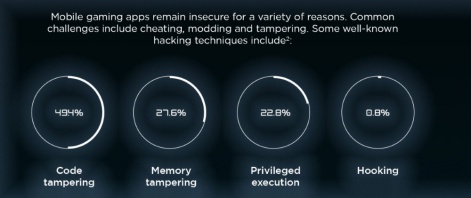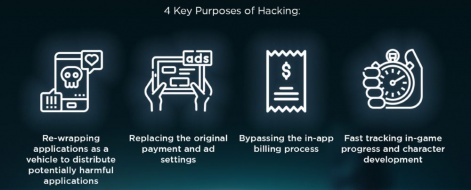[Updated 15 February 2021 with the full RoundTable video.]
Developers are losing out on income because of nefarious behaviours – that’s the big message driving our live video discussion next Tuesday, January 26th. It’s free to watch (just register on Eventbrite) and you’ll discover how tampering and hacking, piracy and plagiarism/cloning, in-game cheating and more are affecting the industry… and how they’re all solvable problems.
Deloitte’s 2020 digital media trends survey found that during the pandemic, a third of consumers have subscribed to a video gaming service, used a cloud gaming service, or watched e-sports for the first time. Newzoo estimated that 2.7 billion gamers worldwide spent $159 billion USD on gaming in 2020, with mobile gaming increasing by 13 per cent since 2019.
But Irdeto’s Global Gaming Survey uncovered that 77 per cent of players are likely to quit a game for good if they feel opponents aren’t playing fair. So there's a lot of money being lost if gamers don’t stick around.
We hosted this informative RoundTable at the end of January 2021.
Ahead of the Pocket Gamer RoundTable sponsored by Denuvo by Irdeto, we spoke to Steeve Huin, CMO and Head of Business Development and Strategic Partnerships at Irdeto. Huin is a seasoned cybersecurity executive with nearly 20 years of experience in the cybersecurity domain. He has a wealth of market knowledge and experience in the video entertainment and mobile gaming industries.
PocketGamer.biz: How widespread is the problem?
Steeve Huin: There are two major buckets of challenges in the videogame space. One is protecting the business of the video game publishers and the people who actually build and release games; protecting games from people copying and distributing them.
Cheating ultimately has an impact because if people decide to give up it impacts the revenuesSteeve Huin
PocketGamer.biz: Piracy?
It’s broader than that, because if you think of the mobile space, one of the major challenges is actually people downloading the game and then ripping it off completely, republishing it under a different name or with different ad networks. So you end up with other people making a lot of money off the original game, which is obviously hurting the real publisher.
So that’s one very big bucket for this business and the money generated. You can think of things like the individual economies as well, where people are trying to get around having to pay for things and so on.
But the second bucket is the gaming community – the experience for the gamers, and all the cheating that happens that actually spoils the party for everybody. This ultimately has an impact on the revenue for the games studios as well, because if people are not as engaged and decide to give up on games, then it impacts the revenues going forward for these games!

PocketGamer.biz: Do you think people realise the scale of the problem?
The largest studios do understand, but I think the smaller ones actually don’t necessarily understand the scale of the problem, nor do they even think it’s possible to address it. That’s part of the larger issue. They don’t understand that it’s actually a solvable problem. It’s not that hard or costly!
PocketGamer.biz: What is the trend? Are these problems getting bigger – or are our tools for solving it getting better?
It’s really both. Irdeto, which is the mother company of Denuvo, also operates in the pay-TV space, the media space – so protecting content – to protecting cars from being hacked, to healthcare and more, as well as protecting videogames.
There are game publishers who are not able to monetise the assets they’re building as well as they couldSteeve Huin
What you realise, if you take a step back, is that it’s a game of cat and mouse! Where you’re constantly improving the technologies, the hackers are constantly improving in what they’re doing as well and getting smarter at attacking platforms. It’s really like an arms race.
Is it getting worse? I don’t know that it is, but it’s certainly not getting any better. There are a lot of game publishers who are not as successful as they could be. They’re not able to monetise the assets that they’re building as well as they could. And that’s impacting everyone else, because that’s taking away money they could invest in their next game or the updates of the game.
PocketGamer.biz: And say a developer does want to solve that problem, what does a solution look like?
I think our approach is uber-cool because it’s actually designed for simplicity. Across the spectrum of everything that we do, we operate at a binary level. What that means, without getting too much into the weeds of the technical stuff, is that developers don’t have to worry about writing code to protect their games.
All they need to do is, towards the end of the development cycle – once they’re getting closer to the release date – is give us the game, completely ready; and we work on it and give it back secured. We take care of everything. They don’t have to worry about questions like, 'What variables do we need to protect?' and 'How do we need to protect it?' All those things are part of what makes Denuvo unique, where we take care of everything and it’s all automated so that developers have a worry-free experience.

PocketGamer.biz: There’s ‘securing a game against pirates’ and then there’s the ‘anti-cheating’ side of things. Are the solutions very different? Will a company need a specific solution, or do they always need a holistic solution?
There’s a truckload of exceptions to the rules, of course. But in practice, you’ll find a need for anti-cheat technologies in games where there is a competitive environment, where people are playing against each other. Typically, that means the game’s online, which means the business model is not so much about selling the game, but rather, actually getting people on the platform - typically for free - and then in-game purchases. .
I think mobile is different because there’s this significant threat of people stealing the games and republishing them. So I guess it also varies a little bit. So what you’ll see is, in the mobile space, you would typically want both. It’s called anti-tamper technology. It’s not so much, actually, that people are redistributing the game to their friends; it’s that somebody’s going to make money off your game by republishing it.
The games are maybe republished on different app stores. You, of course, have the Google one, but there are all the variants around. And that becomes a tremendous problem, because the company that actually put the effort and resources into building the game and investing in all the graphics and so on is suddenly not bearing the fruit of all the effort.
PocketGamer.biz: What do you hope that people take away from the RoundTable session?
Our aim is to educate people on the problem – and how easy it is to solve the problem. Because you have this arms race of the security players, all you’re doing is not so much building an impenetrable defence, but making it hard enough for people to give up and go hack something that’s not as secure.
To enable a secure future, in a way you can raise connectivity without fear. That’s our mission at the highest levelSteeve Huin
PocketGamer.biz: You make it intractable, rather than impossible.
That’s exactly right. So for me, that’s the aim. It’s to get people on the fact that there is a vast problem and people could be making a lot more money than they are potentially, but it’s easy to solve.
PocketGamer.biz: Irdeto has been the world leader on PC platforms for the last five or 10 years and on game consoles too. Why do you think it’s particularly important for us to talk about this on mobile now?
The pandemic has created a few new trends and one is that people are spending more time playing games, especially on their phones. If you look at the overall market sizes, the mobile games segment is becoming larger and larger to the extent that it is predicted to completely dominate the revenues, versus game consoles and PC. It is important for that revenue to be protected going forward.
The PC market is always a pain for gamers to have the latest specs to keep gaming. But you have the phone in your pocket anyway, right? There’s a broader category of people. It’s opened up the space for players. You have all these casual gamers that never had consoles or played on PC, but now they love playing Words With Friends or whatever. It’s easy to get into that.
PocketGamer.biz: You’ve just got into mobile. What are your priorities for the year ahead?
To help as many games studios as possible and bring fun and fairness back to online gaming. If you look at the broad mission for Irdeto as a whole, it’s actually to enable a secure future, in a way you can raise connectivity without fear. That’s our mission at the highest level.
That feeds down into everything we do, from making sure you can drive your car without being worried of somebody remotely crashing you into a wall, to hacking your pacemaker and dying, to somebody messing with your game so you lose again and again to somebody that’s really not that skilled.
We have a lot of excitement around our newest products and there’s so many games that need help. So we’re super-excited about that.
PocketGamer.biz: Thanks Steeve.
To discover more on this topic - and to hear what other voices have to say about the challenge - please view the video from the RoundTable held on Tuesday January 26th. Our RoundTables are free, semi-regular panels broadcast on our YouTube channel. We also host more content like this during our Pocket Gamer Connects conferences. The next is PGC Digital 6 which will take place in April 2021.






















